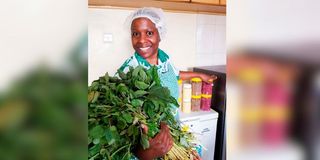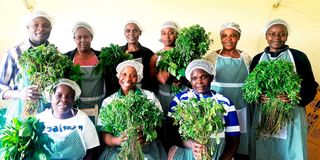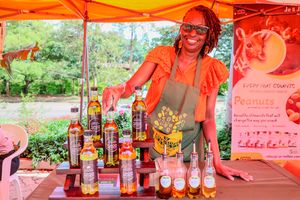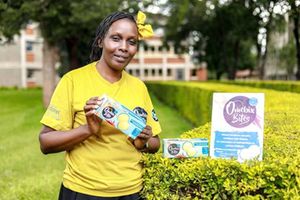
Miriam Nabakwe at her office along Ring Road, Kilimani.
Driven by the urge to help investors in the hospitality sector run their businesses properly and successfully, Miriam Nabakwe left her prestigious role as food and beverage manager in a five-star hotel to become a consultant in the sector. But to her disappointment, not many were keen to tap into her vast knowledge of the industry.
She struggled to secure contracts and thought about a sustainable business model. Inspired by a period of reflection, she decided to devote herself entirely to cooking authentic traditional vegetables, which many consider labour-intensive.
“Looking at today’s lifestyles, people have little time to prepare labour-intensive local vegetable meals so I thought why not offer that convenience by taking away the difficult part of preparation – plucking, sorting, washing, initial cooking and packaging, and sell as pre-cooked,” says Miriam, the founder of Kienyeji’s Store Limited. The business prides itself on authentic traditional cooking of kienyeji vegetables and other traditional foods.
Starting the business as a side hustle to supplement her income, Miriam's tapped into her circle of friends as her first customers, who ordered weekly and, encouraged by this, she took her products to social media and stopped her consultancy work to concentrate fully on the business.
The originality and taste of the products kept customers coming back.

Miriam Nabakwe in a past photo. She runs Kienyeji Store, a business that sells traditional vegetables.
And having started with low volumes in 2014, Miriam says it was a bit of a struggle at first and she felt her idea wasn't relevant and not many people could relate to it.
“At some point, I stopped, took a break and went back to employment to earn more money, build more capital and re-establish myself, but it wasn’t long before I got back to the business with more focus,” she recalls.
She says there were days when she didn't make a single sale, even after making so much noise on social media, because people couldn't understand what she was coming up with until Covid-19 hit and people became more aware of healthy eating and living.
“That’s the time I became more relevant and it pushed the business from my house to a central kitchen in Ring Road, Kilimani with increased production capacity and quality control plus an eatery of five small tables, which I later increased to 20,” says Miriam.
Streamlining the supply chain
The production of indigenous vegetables is largely done by smallholder farmers who are mostly dependent on rainfall, so consolidation for a continuous year-round supply can be problematic for any hospitality business. So how did Miriam solve the puzzle?
“I engaged indigenous vegetable suppliers in Gikomba market who understood what I was looking for. They became my networks in the villages, making it easy to source authentic traditional vegetables until I started producing my own,” she says.
To further strengthen and secure the supply chain, Miriam plans to set up a unit to produce indigenous vegetable seeds and distribute them to farmers, who will in turn supply her firm with vegetables.
“There are variants of indigenous vegetable seeds in the market, which doesn’t give the uniformity in tastes and originality and that’s what I’m trying to solve.”
With the business on the right track and customers asking for other dishes such as chicken and beef, Miriam saw an opportunity to expand her product range from 5 varieties to 18 combinations of traditional vegetables.
Initial struggles
Miriam says that although it was a unique business concept with potential for growth and good returns, the lack of capital to purchase assets and run the business was a challenge, and because customers did not quickly understand the products and services she was offering, sales were low to the point that she was auctioned off due to rent arrears, forcing her to move the business from Hurlingham in Nairobi to Kawangware.

Miriam Nabakwe (front, centre) in a past photo. She runs Kienyeji Store, a business that sells traditional vegetables.
“In hindsight, that downgrading worked well for me because it pushed me to a new location in Kilimani and eventually a central production kitchen and two outlets,” adds Miriam.
She says that Kienyeji's Stores Limited currently has two concepts in one – retail and restaurants, with the former having all the vegetables and pre-cooked food and the latter serving walk-in customers, although her original thought was to set up retail stores for traditional vegetables only.
Despite steady organic growth, Miriam says her biggest challenge is the high cost of rent, not to mention the heavy taxation that eats into her income, and with a team of 50, the entrepreneur says the bills are just too high.
“The cost of goods has also gone up. With the rains, one expects plenty supply of vegetables but it is the opposite because heavy rains destroy the vegetables in the farms and you can’t keep changing menu prices all the time; customers will drop off,” Miriam says.
Franchising
Miriam says that when she started the business she set out to do everything professionally because her bigger vision was to get into franchising, so she had to put proper standard operating procedures and systems in place to make it easy to sell a franchise.
“I’m not keen on opening many outlets because I want to go the franchise way and through that, the brand will grow fast. I’m keener on controlling products’ quality through a central production kitchen known as commissary where I will be supplying them with food as they focus on running the restaurants. I hope to actualise that within two years,” she explains.
The hotelier says she's working on the franchise foundation, first building the brand and then looking for certified franchise experts to guide the process.
For her, the bigger picture is to first set up a flagship for the franchisees because you have to have a specific design that will be replicated everywhere and her current two outlets in Lavington and Ring Road, Kilimani are her school of learning to understand what will work.
“When setting up a franchise, you can have different types of small, medium or large outlets, which must have designs. We are consolidating them to have 3 different profiles for every level of investor,” she says.
“Our small outlet is in Lavington, medium in Ring Road Kilimani and what’s remaining is a fully fledged restaurant with a sitting capacity of 100 pax and above.”
Miriam adds that the company has also outgrown its current central kitchen and plans to expand to include a training school and head office, for which she's seeking financial support.
Looking back
The former Dominos District Manager in the United States says her biggest regret was going back to work because she would have been so far with the business by now, but on the flip side, it was a blessing in disguise because it equipped her with skills in developing a standard procedure manual for food outlets and how franchising works. She took that back to her business.
“The other is ‘emotional hiring’ – hiring based on feelings and people you know. I had a rough patch of employees identifying lapses and fleecing the business. That taught me the value of putting proper systems in place to seal loopholes and have controls,” she concludes.






